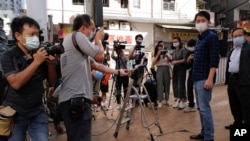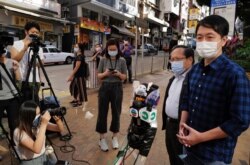Three former pro-democracy Hong Kong lawmakers were arrested Wednesday for disrupting legislative proceedings earlier this year.
Ted Hui, Eddie Chu and Raymond Chan revealed their arrests on their Facebook pages.
The arrests stem from two separate incidents back in May and June when the legislature was debating a bill that would criminalize any disrespect or abuse of the Chinese national anthem.
A legislative session in late May was interrupted when Hui rushed to the front of the chamber and dropped a rotten plant in the middle of the floor. Days later, Chu and Chan also rushed the chamber and held up a sign that said “A murderous regime stinks for ten thousand years” before dropping a pot of stinking liquid on the floor.
Hong Kong police said in a statement they had arrested three ex-lawmakers and charged them with contempt and attempting to cause harm with a dangerous substance. The lawmaker’s names were not revealed in the statement.
Hui was among 15 pro-democracy lawmakers who resigned en masse last week after four of their colleagues were expelled after a Chinese legislative committee approved rules saying that Hong Kong’s government could disqualify any lawmaker believed to be a threat to national security without going through the courts. The ouster and subsequent resignations leave the 70-seat Council with only pro-Beijing lawmakers.
Chu and Chan resigned their seats several weeks ago after Chief Executive Carrie Lam postponed legislative elections scheduled for September by one year, citing the COVID-19 pandemic.
The trio were among seven pro-democracy lawmakers who were arrested for taking part in a physical confrontation with pro-Beijing lawmakers at a separate Legislative Council meeting in May.
The arrests are the latest actions by authorities to stamp out Hong Kong’s pro-democracy movement since the new national security law took effect on July 1.
Under the new security law, anyone in Hong Kong believed to be carrying out terrorism, separatism, subversion of state power or collusion with foreign forces could be tried and face life in prison if convicted.
The new law was a response to the massive and often violent pro-democracy demonstrations that engulfed the financial hub in the last half of last year.
Western governments and human rights advocates say the measure effectively ends the self-autonomy guaranteed under the pact that switched control of Hong Kong from Britain to China in 1997.









